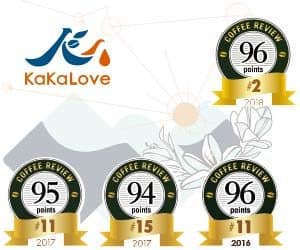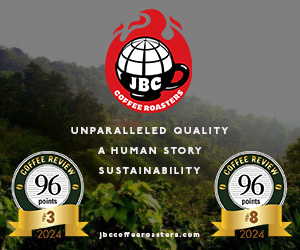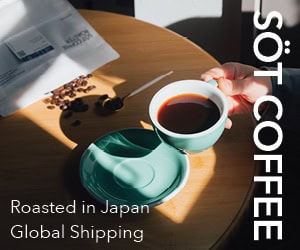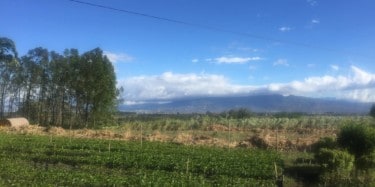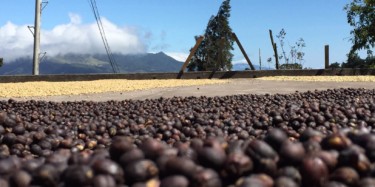Produced from trees of the respected Catuai and Caturra varieties of Arabica at Calle Liles Farm and processed by the red honey method, which means that the outer skin is removed as it is in the wet or “washed” process, but all of the sticky fruit residue is allowed to dry on the bean and later removed by machine along with the parchment skin. Located in southwestern Colorado, Durango Coffee lays
SEARCH RESULTS
Panama Elida Natural Lot #26
A “natural” or dry-processed coffee, meaning the beans were dried inside the fruit, encouraging a flavor profile that is sweeter and deeper-toned than the more familiar wet-processed coffees of Panama. Produced entirely from trees of the respected Catuai variety of Arabica. The Lamastus family’s Elida Estate averages the highest growing elevations in Panama: 5,500 to 8,200 feet (1,700 to 2,500
Panama Dos Ruedas
Produced by Alexis Batista from trees of the Catuai, Caturra, Typica and Gesha varieties of Arabica. Processed by the wet or washed method (fruit skin and pulp are removed before drying). This coffee tied for the top rating in a tasting of single-origin espressos from the Americas for Coffee Review‘s November 2016 tasting report. Joe Van Gogh is a small-batch roasting company with a focus on
Guatemala Palo Blanco
Produced by the Ovalle Altuve family at Finca Palo Blanco from trees of the Bourbon, Caturra and Catuai varieties of Arabica. Processed by the wet or washed method (fruit skin and pulp are removed before drying). This coffee tied for the second-highest rating in a tasting of single-origin espressos from the Americas for Coffee Review‘s November 2016 tasting report. Based in southern Oregon, Noble
Las Lajas Alma Negra Full Natural
Certified organic. Produced from trees of the respected Catuai and Caturra varieties of Arabica and processed by the natural method, meaning the beans were dried inside the fruit rather than after the fruit has been removed, as is the case with wet-processed or “washed” coffees. Established in 2010, Red Rooster is an organic-certified micro-roaster focusing on socially conscious coffee and
Panama Finca Mama Cata Microlot Tona
This exceptional coffee was selected as the No. 22 coffee on Coffee Review’s list of the Top 30 Coffees of 2016. Produced by José David Garrido Pérez from trees of the Green Tip Gesha, Red Catuai, Green Tip Typica, and Bronze Tip Typica varieties of Arabica. Processed by the wet or washed method (fruit skin and pulp are removed before drying). Roasted at PT’s Coffee, where the motto is “without
El Salvador Laguna Las Ranas
Produced by Jose Antonio Salaverria of Finca San Francisco from trees of the Bourbon, Catuai and Pacas varieties of Arabica. Processed by the honey method, which means that the outer skin is removed as it is in the wet or “washed” process, but at least some of the sticky fruit residue is allowed to dry on the bean and later removed by machine along with the parchment skin. Mojo Coffee is a New
Costa Rica Sol Naciente White Honey
Produced by Aguero Cedral entirely from trees of the Catuai variety of Arabica. Processed by the white honey method. With all honey processing methods, some sweet pulp or fruit flesh (“honey”) is allowed to adhere to the beans during drying. In the white honey variation, an extremely thin layer of pulp is allowed to dry on the beans, less than with yellow honey, and much less than is the case with
Cafe Rivense Costa Rica El Mango
Produced at Cafe Rivense farm by the Urena Rojas family from trees of the Caturra and Catuai varieties of Arabica and processed by the black honey method. With all honey processing methods, some sweet pulp or fruit flesh (“honey”) is allowed to adhere to the beans during drying. In the black honey variation, the beans are subjected to a slower drying process than is the case with yellow or red
Costa Rica Dota El Vapor
Produced from trees of the Caturra and Catuai varieties of Arabica by the Cooperativa de Caficultores de Dota, a cooperative admired for its environmental and social initiatives as well as its fine coffees. Processed by the wet or washed method (fruit skin and pulp are removed before drying). This coffee tied for the third-highest rating in a cupping of Costa Rica coffees for Coffee Review‘s
Costa Rica Los Crestones Double-Washed
Produced by Esteban Zamora at La Cruz micro-mill from trees of the Caturra and Catuai varieties of Arabica. “Double-washed” refers to the mechanical removal of 70 percent of the fruit flesh or mucilage, then soaking the beans to remove the rest. This coffee tied for the third-highest rating in a cupping of Costa Rica coffees for Coffee Review‘s October 2016 tasting report. Augie’s Coffee Roasters’
Costa Rica Finca La Pastora Carlos Montero Lot #1
Produced entirely from trees of the Catuai variety of Arabica by Carlos Montero on one of four small farms owned by the husband-and-wife team of Carlos and Lucia Montero. Processed by the white honey method. With all honey processing methods, some sweet pulp or fruit flesh (“honey”) is allowed to adhere to the beans during drying. In the white honey variation, an extremely thin layer of pulp is
Las Lajas Perla Negra Natural
This exceptional coffee was selected as the #28 coffee on Coffee Review’s list of the Top 30 Coffees of 2016. Produced by Las Lajas farm from trees of the Caturra and Catuai varieties of Arabica. This is a dry-processed or “natural” coffee, meaning the beans were dried inside the fruit rather than after the fruit has been removed, as is the case with wet-processed or “washed” coffees. This coffee
Costa Rica 2016: Innovation and Success in a Changing Market
It has been more than a decade since Coffee Review explored Costa Rica coffees in depth, though we cup many individual samples each year from this small, coffee-celebrated Central American country. In the last year alone, we reviewed 26 Costa Rica coffees at ratings of 91 to 96, including one, Temple Coffee’s Costa Rica Alberto Guardia Venecia Honey (94), which landed at the #17 spot on our 2015
Myanmar Mya Za Di Natural
Produced from 95% Catuai and 5% Caturra varieties of Arabica. A dry-processed or “natural” coffee, meaning the beans were dried inside the fruit rather than after the fruit has been removed, as is the case with wet-processed or “washed” coffees. Dragonfly Coffee is a Boulder, Colorado-based micro-roaster that produces high-quality coffees and supports worthy causes. Visit
Beyond the Review: Celebrating Coffees in Depth
This is not your typical Coffee Review tasting report. In fact, it is something of an unplanned improvisation. We originally had scheduled a tasting report on coffees of Costa Rica this month, but we decided to postpone it until next month, October. It turned out that Costa Ricas were slow to arrive in roasters’ warehouses this crop year, and we feared that if we rushed the article we would miss
Elida Natural Dragonfly Lot
A fine example of a “natural” or dry-processed coffee, meaning the beans were dried inside the fruit, encouraging a flavor profile that is sweeter and deeper-toned than the perhaps more familiar wet-processed coffees of Panama. Produced entirely from tree of the respected Catuai variety of Arabica. The Lamastus family’s Elida Estate averages some of the highest growing elevations in Panama coffee.
Honduras Natural
Produced Miriam Elizabeth Perez of COMSA Cooperative in Marcala, Honduras of the Bourbon, Catuai and Typica varieties of Arabica. This is a “natural” or dry-processed coffee, meaning the beans were dried inside the fruit rather than after the fruit has been removed, as is the case with wet-processed or “washed” coffees. The company name Amavida combines the Spanish words for love and life,
Costa Rica Tarrazu
Produced from trees of the Caturra and Catuai varieties of Arabica and processed by the wet or washed method (fruit skin and pulp are removed before drying). Cups Espresso Cafe was founded by Janice and Dennis Cameron in 1993, and the couple has been roasting in house since 1994. Their cafe is a space where artists can present their work and patrons can enjoy fine coffees in a casual atmosphere.
Guatemala San Antonio El Bosque
Produced by Roberto Martinelli of the Bourbon, Catuai, Caturra and Villa Sarchi varieties of Arabica. This is a wet-processed or “washed” coffee, meaning the fruit skin and pulp were removed from the beans immediately after harvesting and before drying. Mojo Coffee is a New Orleans-based roaster specializing in ethically sourced, hand-sorted and small-batch-roasted coffees. It strives to highlight





